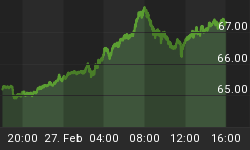Taxpayers take note.you could get a much bigger tax bill than you expect.
The California State Teachers' Retirement System (CalSTRS) recently announced that it may move 12% of its assets, or $20 billion, out of stocks and bonds.
CalSTRS is the second-largest public pension fund in the U.S. It manages roughly $191 billion for 868,000 teachers in California.
CalSTRS made this announcement immediately after the U.S. stock market's sharp selloff last month. Casey readers know the S&P 500 plunged 11% in six days, its worst selloff in more than four years.
While we can't know for sure, CalSTRS likely lost billions in the selloff. The fund's officers said they want to put more money in assets that "will perform well if the markets tumble." They're considering U.S. Treasuries, hedge funds, and other alternative investments.
CalSTRS isn't the only pension fund scrambling to reduce risk. The Wall Street Journal reports:
Pension funds across the U.S. are wrestling with how much risk to take as they look to fulfill mounting obligations to retirees, and the fortunes of most are still heavily linked with the ebbs and flows of the global markets. State pension plans have nearly three-quarters, or 72%, of their holdings in stocks and bonds, according to Wilshire Consulting.
Public pension funds are nervous about losing money.
Because they've made promises they can't possibly keep.
Public pensions manage retirement money for government workers. Many teachers, firemen, and police have public pensions. If you're a taxpayer living in a state that has public pensions, part of your tax bill goes toward these pensions.
According to think tank State Budget Solutions, state pensions are currently underfunded by $4.7 trillion. "Underfunded" is the difference between what they promise to pay and the amount of money they have on hand to actually pay it.
Public pensions can't possibly make up that huge gap. It would require taxing $15,000 from every man, woman, and child in America. And the gap grows every year (it was $4.1 trillion last year).
Some states are already on the brink. Illinois only has enough money to cover 22% of its promised payments. Illinois will have a pension crisis. The only question is "when?"
Public pensions are a slow motion train wreck that can't be stopped. Millions of workers who expect a steady stream of income when they retire will get nothing. The U.S. public pension system is mathematically guaranteed to crash.
How'd this happen?
Some states simply promise ridiculously huge pensions to public workers. According to Forbes, the average annual pension promised to a CalSTRS teacher who worked from age 23 to 65 is over $110,000 per year. That's more than double the average income for an entire family of four in the U.S.
Another reason is that state pensions use pie-in-the-sky estimates for how much their investments will earn. According to the National Association of State Retirement Administrators (NASRA), U.S. public pensions expect to earn 8% per year on average.
That's a wildly optimistic number. They're extremely unlikely to earn anything close to 8% per year.
Earning 8% per year in normal times is difficult enough. And as Casey readers know, we're not in normal times.
Returns on both bonds and stocks will likely be low or negative for the next many years. With interest rates at historic lows, bonds barely pay anything. And U.S. stocks have very little upside because they're so expensive today.
Expecting returns to average 8% per year going forward is foolish. And we're not the only ones who think so. BlackRock (BLK), the world's largest asset manager, says state and local pensions should expect to earn 4% per year or less going forward.
The average public pension earned just 3.4% last year. And Bloomberg Business reports that the California Public Employees' Retirement System (CalPERS), the largest pension fund in the U.S., earned just 2.4% last year.
CalPERS, at $300 billion the largest public pension in the U.S., reported in July that it earned 2.4 percent in its last fiscal year, less than one-third its 7.5 percent target. The fund's board may consider slowly cutting its rate to 6.5 percent as part of a plan to reduce risk, according to fund documents.
Why should you care?
Because you might be on the hook.
Most governments won't have the money to pay what they've promised. BlackRock projects that a stunning 85% of US public pensions will fail over the next three decades.
However.what most people don't know is many state constitutions require states to honor their pension promises. In many states, it's illegal for the government not to pay teachers, firemen, or police what they've promised. Even if those promises are ridiculous.
As a taxpayer, you're the backstop for these promises. Governments don't produce any money. They can only extract money from their citizens as taxes.
So if you live in a state where a pension goes bust.don't be surprised if your government picks your pocket to make up the difference.
Here’s our advice: learn how to legally move some of your money out of your government’s reach. We published a new book that shows you simple strategies for doing this. And until we run out of copies, we’ll send you one for virtually nothing. We just ask that you pay $4.95 to cover our processing costs. Click here to claim your copy.
The article Pay Your Fair Share (to the Teachers’ Union) was originally published at caseyresearch.com















